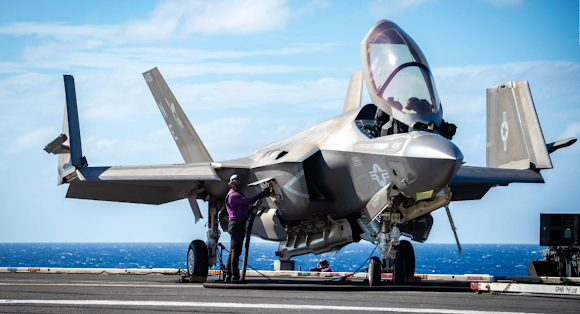Dodging rockets, u.s marines battle a brutal enemy. The u.s military has a
range problem none of the tactical aircraft used by the US air force, navy
and marine corps can fly far enough, with a useful payload to take off from
major u.s bases and strike the most urgent targets in the likeliest war
zones without the help of a lot of vulnerable aerial tankers.
The Pentagon's sharpening focus on possible conflict with china has only
underscored this tyranny of distance.
The big american air bases in Guam and Okinawa respectively are thousand and
one thousand three hundred miles from the disputed spratly islands in the
south china sea.
The u.s marine corps for one is trying hard to cross this vast expanse. The
amphibious branch plans to send young marines on risky missions setting up
quick and dirty airfields on small islands.
Many hundreds of which dot the western pacific ocean. The Impromptu airbases
would function as temporary refueling and rearming stops for the corpse F-35
stealth fighters. Hopefully allowing the short-legged jets to travel farther
than builder lockheed martin intended.
Marine fighter attack squadron 211 and its parent third marine aircraft wing
rehearsed this long-range strike technique starting late last month as part
of exercise winter Fury 22.
"We've got to find every advantage we can out there," said Lieutenant
Colonel Andrew Dembrogi commander of vmfa 211 and F-35B jump jet unit in
Yuma, Arizona.
30 years ago this method of projecting air power might not have been
necessary in some scenarios. The marines operated Subsonic A6 attack planes
that could haul a useful bomb load a thousand miles on a single tank of gas.
The supersonic F-35 can fly only half as far. The recent exercise revealed
how a lot of marines, working together can stretch the F-35s legs.
It all started on january 31st, when a california-based marine infantry
company flew in a Gaggle of Y-22 tilt rotors to grant county municipal
airport in snowy moses lake washington.
The infantry took control of the airfield and set up a security perimeter,
making it safe for personnel from marine wing support squadron 373 to
deploy.
The support troops brought along aviation fuel refueling gear and aim 120
air-to-air missiles.
The F-35B's took off from yuma topped off their tanks from marine KC-130
tankers then flew the roughly 1200 miles to moses lake, where they refueled
loaded up a pair of AIM-120s each and flew back to Yuma, fast enough,
planners hoped to dodge a retaliatory missile barrage.
There's enough threats out there that what it really comes down to is time
criticalness.
"How much time i can spend in one location," Dembrogi said.
The idea is for marines to jump from island to island, setting up new
airstrips faster than the enemy can find and attack them.
The marines aren't assuming they'll always avoid incoming rockets. They
might have to take a few hits and keep working.
As part of winter fury 22, the third mob blew up an unused part of the
airport tarmac then repaired. it it's possible for an F-35B with its
downward blasting lift engine to use a damaged runway of course.
"I don't need a whole lot of distance to take off from," Dembrogi said.
An F-35B in theory can launch and land vertically, although that burns a lot
of gas. It's better to use a few hundred feet of runway.



